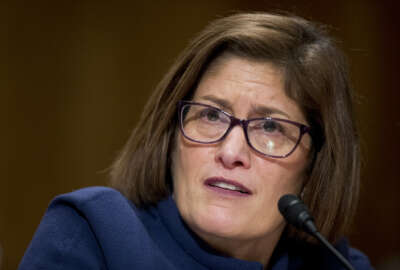The Justice Department is getting a chance to argue its case before the Supreme Court on the eligibility of presidential appointees, setting the stage for a potential decision that could redefine rules for future administrations and reverse the policies of previous appointees — notably Office of Personnel Management acting Director Beth Cobert.
SCOTUS on June 20 granted DoJ a writ of certiorari, clearing a spot on its calendar for the justices to weigh in on a Federal Vacancies Reform Act interpretation.
Eric Crusius, who represents government contractors at the law firm Miles & Stockbridge, said while SCOTUS does not take many cases, it wasn’t surprising this case got a nod.
“While the percentage of cases the court takes is low (less than 10 percent), the percentage is higher for appeals initiated by the federal government such as the one here,” Crusius said in an email to Federal News Radio. “Often times a case can become moot during the pendency of the case like could be the case here, if the administration’s appointee loses her position by virtue of a new administration coming in. Here, however, at least part of the issue is whether the actions taken by the appointee would still be valid. To the extent those actions would impact the next administration (the orders do not disappear when a new administration comes in), the court would likely still hear the case because the alleged harm is still ongoing.”
A spokesman for OPM said the agency had nothing to add to its statement earlier in the year, that both the agency and administration were following the Justice Department’s view “on the lawfulness of nominees serving in an acting capacity.”
Among the guidance and directives issued from Cobert between Nov. 10 and June include:
- Implementation of onboarding requirements for senior executives
- The introduction of a course on workplace flexibilities
- Guidance on certain interagency personnel rotations
- Guidance on recruitment, relocation, and retention incentives
- Washington, D.C., Area Dismissal and Closure Procedures
Cobert has held the acting director position since July 2015, when former OPM Director Katherine Archuleta resigned.
Her eligibility to continue to serve in that role was called into question by former OPM Inspector General Patrick McFarland.
An OIG spokesperson told Federal News Radio in a February email that the potential violation was discovered when auditors began researching responsibilities under the FVRA on how to replace the retiring IG.
At issue is an August 2015 decision by the U.S. Court of Appeals for the D.C. Circuit in the case of SW General, Inc. v. National Labor Relations Board (NLRB).
Three years ago, SW General questioned whether one of NLRB’s senior executives became ineligible to serve as acting General Counsel when the President nominated him to be General Counsel.
The court rejected NLRB’s argument, saying the acting officer section “applies to all acting officers and not just those officers who previously served as first assistants.”
DoJ sought additional review from the court but the D.C. Circuit denied the petition. The Justice Department then petitioned the Supreme Court to weigh in.
Copyright
© 2024 Federal News Network. All rights reserved. This website is not intended for users located within the European Economic Area.
